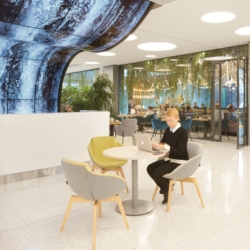September 24, 2020
Workers long for clarity in their relationship with employers
 Employees are longing for purposeful and visible changes to increase safety measures in the office, according to a new survey of 2,000 people from NELSON Worldwide. This is top of people’s minds in order to assure that re-entry in the workplace is safe, according to the firm. Whether this is carried out by means of wayfinding, increased sanitation protocols, or direct implementation of distancing in workstations, staff are eager to see the action carried out. The survey concludes that 83 percent of employees have rated physical safety measures to be extremely or very important. (more…)
Employees are longing for purposeful and visible changes to increase safety measures in the office, according to a new survey of 2,000 people from NELSON Worldwide. This is top of people’s minds in order to assure that re-entry in the workplace is safe, according to the firm. Whether this is carried out by means of wayfinding, increased sanitation protocols, or direct implementation of distancing in workstations, staff are eager to see the action carried out. The survey concludes that 83 percent of employees have rated physical safety measures to be extremely or very important. (more…)









 A new survey from
A new survey from 










 As the UK is in the midst of the traditional ‘back to school’ period, many workplaces are debating over when to return to the office, and how. The sudden move to remote working during lockdown has proven that a new hybrid way of working is in fact possible for numerous organisations, but this has come at the expense of face to face communication and in person collaboration.
As the UK is in the midst of the traditional ‘back to school’ period, many workplaces are debating over when to return to the office, and how. The sudden move to remote working during lockdown has proven that a new hybrid way of working is in fact possible for numerous organisations, but this has come at the expense of face to face communication and in person collaboration. 


 A new survey by UK job board
A new survey by UK job board 










September 24, 2020
The magical limits of workplace design
by Mark Eltringham • Comment, Workplace, Workplace design
(more…)